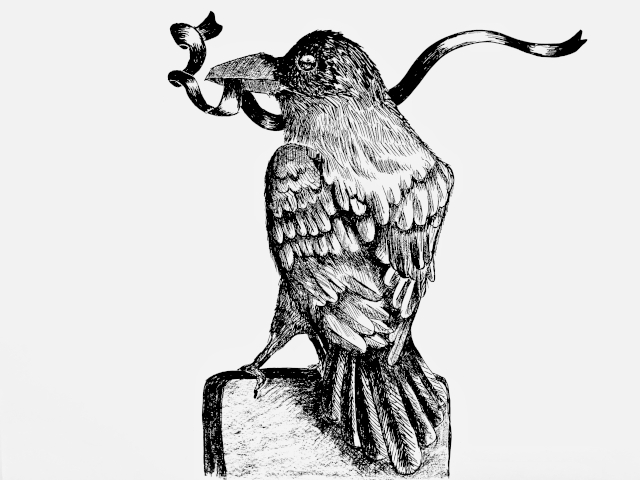Short Fiction by Tabitha Potts
I was a foundling brat, rescued from the hedgerows where I lay with my beak open, screeching fit to wake the devil. I often think it very likely the first thing I ever saw was a bird in its nest. The people here are thin-mouthed and hard-fisted; you’re as likely to get a stone as a piece of bread from them. Still, the Watts took me in, as they had neither chick nor child. Jonah said to his wife Sally that having another pair of hands would be useful.
As I grew up, I couldn’t understand what was being said to me: all I saw was beaks opening and closing. When I tried to speak, people laughed and called me ‘Crow Girl’. Jonah and Sally talked to me with gestures, and when that failed, cuffs to the head.
I understood I had to work hard to earn my keep and I became a silent, frightened thing. I learned to read and write a little, from looking at any picture books and papers that I could get my hands on, but I couldn’t speak.
My friends were the birds. I spent so much time in the woods with them I knew where they built all their nests, when they arrived in Spring and when they would leave for Winter. The only things I didn’t know about them were their songs, but I could recognise every one from a single feather or an egg.
I would feed them whenever I could find food to give them, and some of them got to know me, especially the crows who never forget a human face. I would stand in the woods in my red dress, and the crows would fly to me. I even helped one who had broken his wing, splinting it and nursing him back to health.
Every Autumn there was a fair in a larger village a few miles away. Usually, I didn’t get to go but this year Sally sent me as she wanted some lace and ribbons for her clothes. It was the first time I’d been so far away from home. I had a note in my pocket for the lace-maker and the ribbon seller and a few coins in my purse and my heart beat fast as I walked along the highway.
When I reached the fair I was footsore and weary, but I knew I had to find the lace and ribbons before I could look for a place to sleep. There seemed to be hundreds of people, there was the smell of meat cooking which made my belly rumble. There were so many tents decorated in bright colours.
It was hard for me to find the lace-maker, but eventually, I did, and she understood my gestures and the note I gave her. I got three fine collars for a good price. Then I went to look for the ribbon seller.
He was a handsome lad with a free and easy air about him and dark hair and eyes like mine. When I showed him my note he shook his head, he couldn’t read. Then he smiled and started showing me his ribbons.
One was pale blue like a robin’s egg, soft like down. I nodded. One was dark blue and satin shiny as a jay’s feather. I smiled back at him and handed him a coin. Then he took out a scarlet ribbon, as bright as a robin’s breast and put it in my hair and gave me a kiss.
With that ribbon, he bound me to him for good, for I was a foolish girl who knew nothing of men. But I was just a fairing for him, and he was a pedlar after all. I never saw him again after that one night we spent together, warm and happy in the nest we made for ourselves.
When I started showing three months after the fair Sally boxed my ears and told the priest and he told her to throw me out. I wasn’t sad to leave the Watts; I’d never known much kindness under their roof. I knew my friends would look after me.
I moved away from the village, deep into the woods where there was an old cottage. I’d learned how to hunt, fish and forage from all my time alone there and so there was enough food for me and my little egg at first. Then winter came and life was hard for me.
Sometimes Sally came with a loaf of bread or a bottle of beer and some cheese. I think she felt bad for me. Before I got too big, the village men would pay me for an hour or two between my thighs. I didn’t care. I only wanted to feed my egg and see it hatch.
When the priest came to see me one night and offered me a coin, I shook my head and held up two fingers. Charged the bastard double. We had a good dinner the next day, the egg and me. I could feel it jumping inside me, stretching its little wings.
At nights I’d curl up by the embers of my fire, banked up with peat, to keep warm. I’d go outside to piss and I’d see an owl hunting for mice, its great white wings making it look like a ghost and the moon above me as bright as a lantern. When it snowed, I put rags in the windows and kept the fire going night and day. It was a hard winter, especially when the men stopped visiting me but by then I had enough coin laid by to keep my egg warm.
I had a hard time of it when I birthed my babe. But Sally came; she must have known it was my time. She helped me cut the cord, wash and feed him – my fledgling was a little boy. The Spring I spent with him was the happiest time of my life. But then the priest came, with men from the village. They said the babe did not belong with me as I was not fit to be his mother. They stole my fledgling from me.
I went the church on Sunday. I stood in the doorway as the priest was opening his beak and I pointed at him. He looked red and angry and mouthed something at me that might have been ‘whore’. Why, he should know, as would half the congregation.
He came out of his wooden box to shout at me, I laughed in his face and then walked out. As I left the churchyard, I saw an old crow watching me and the priest from the gravestone where he was perched. He had a crooked wing and his eyes were bright.
The next Sunday morning, the villagers came to play me some rough music. Of course, I could hear nothing and only realised when I came out of doors to fetch water and saw them standing round the cottage banging their pots and pans and holding a dead crow, wearing a red dress, on a pole. But my friends the crows heard and as I stood in my doorway, clad only in my shift, I saw one perch in the trees around my old cottage.
He was joined by another, and another, and soon the villagers began to slow down, falter, as a thousand black eyes watched them silently. One of them turned tail and fled, and the rest followed him.
The villagers went on to the church to give thanks for their summer harvest, even though they had done this unholy thing. It was there, in the churchyard, that they found the priest lying dead beneath a tree, surrounded by black feathers.
He had scratches covering his face and all over his body, and his eyes had been pecked clean out so all that was left were bloody holes. There was a crow in the churchyard, the one with the crooked wing, but he flew away.
Three days later, when I woke up, I found my fledgling on the doorstep of my cottage, wrapped in a blanket. I never found out how they got him back, or who did it, although I like to think Sally helped. He grew strong and handsome, and we spoke together with a language we invented ourselves.
As he grew older, he would visit the village and eventually he learned to talk like the others too. He married and lives in the village now, but he visits me every few days with my grandchildren.
The villagers call me Crow Girl no longer, but Crow Lady, and come to me for spells and simples. Every day, I feed my friends. I stand in the door of my cottage and throw crumbs out for them, and they watch me with their bright black eyes.
Illustration by Amy Shepheard
This piece came in the Top 5 in The Mechanics’ Summer Folk Tale Festival
 Tabitha Potts is a writer living in East London, which inspires much of her work. She has had several short stories published in print and online (by Storgy.com, MIROnline, Brick Lane Publishing and Limehouse Books) and was recently long-listed for the Royal Academy and Pin Drop Short Story Award. She loves reading books, looking at art and kickboxing.
Tabitha Potts is a writer living in East London, which inspires much of her work. She has had several short stories published in print and online (by Storgy.com, MIROnline, Brick Lane Publishing and Limehouse Books) and was recently long-listed for the Royal Academy and Pin Drop Short Story Award. She loves reading books, looking at art and kickboxing.
